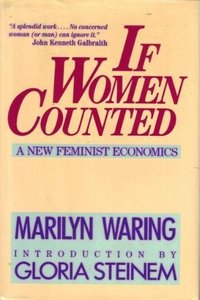If Women Counted
 |
|
| Author | Marilyn Waring |
|---|---|
| Language | English |
| Genre | Political economy, feminism, feminist economics |
| Publisher | Harper & Row, Macmillan‚ Allen & Unwin |
|
Publication date
|
1988 |
| Media type | Print (Hardcover & Paperback) |
| Pages | 386 pp (Harper & Row edition) |
| ISBN | |
If Women Counted (1988) by Marilyn Waring, former New Zealand Member of Parliament, is an influential book in academic feminism, political economy and feminist economics. The book is a groundbreaking and systematic critique of the system of national accounts, the international standard of measuring economic growth, and the ways in which women's unpaid work as well as the value of Nature have been excluded from what counts as productive in the economy.
The book "persuaded the United Nations to redefine gross domestic product, inspired new accounting methods in dozens of countries, and became the founding document of the discipline of feminist economics." A widely cited book, it made the analysis of this topic known to a large audience.
According to Julie A. Nelson,
The noted economist John Kenneth Galbraith called If Women Counted "a splendid work... no concerned man or woman can ignore it."
Counting on Marilyn Waring: New Advances in Feminist Economics, an anthology edited by Margunn Bjørnholt and Ailsa McKay, was published in 2014, with contributions by a diverse group of scholars on recent advances in the field of feminist economics. It was described by economist Alison Preston as "a timely reminder of the politics and economics underpinning what, how and by whom activities and outputs are valued. For those concerned with social justice and sustainable futures this important and powerful book provides an invaluable and practical insight into issues that are in need of greater visibility." According to the magazine Choice: Current Reviews for Academic Libraries, the book explores "a wide range of issues—including the fundamental meaning of economic growth and activity to consumption, health care, mortality, unpaid household work, mothering, education, nutrition, equality, and sustainability" and reveals "the breadth, depth, and substance that can grow from innovative ideas and critical analysis."Diane Elson argues that "despite many valiant efforts, women do not as yet really count in the conduct of economic policy. This book is an imaginative contribution to an ongoing struggle." In a review in Feminist Economics, Patricia E. Perkins calls the book "a joy to read and a revelation", and "a fitting culmination of [McKay's] lifelong work using economics to advance equity for women."
...
Wikipedia
